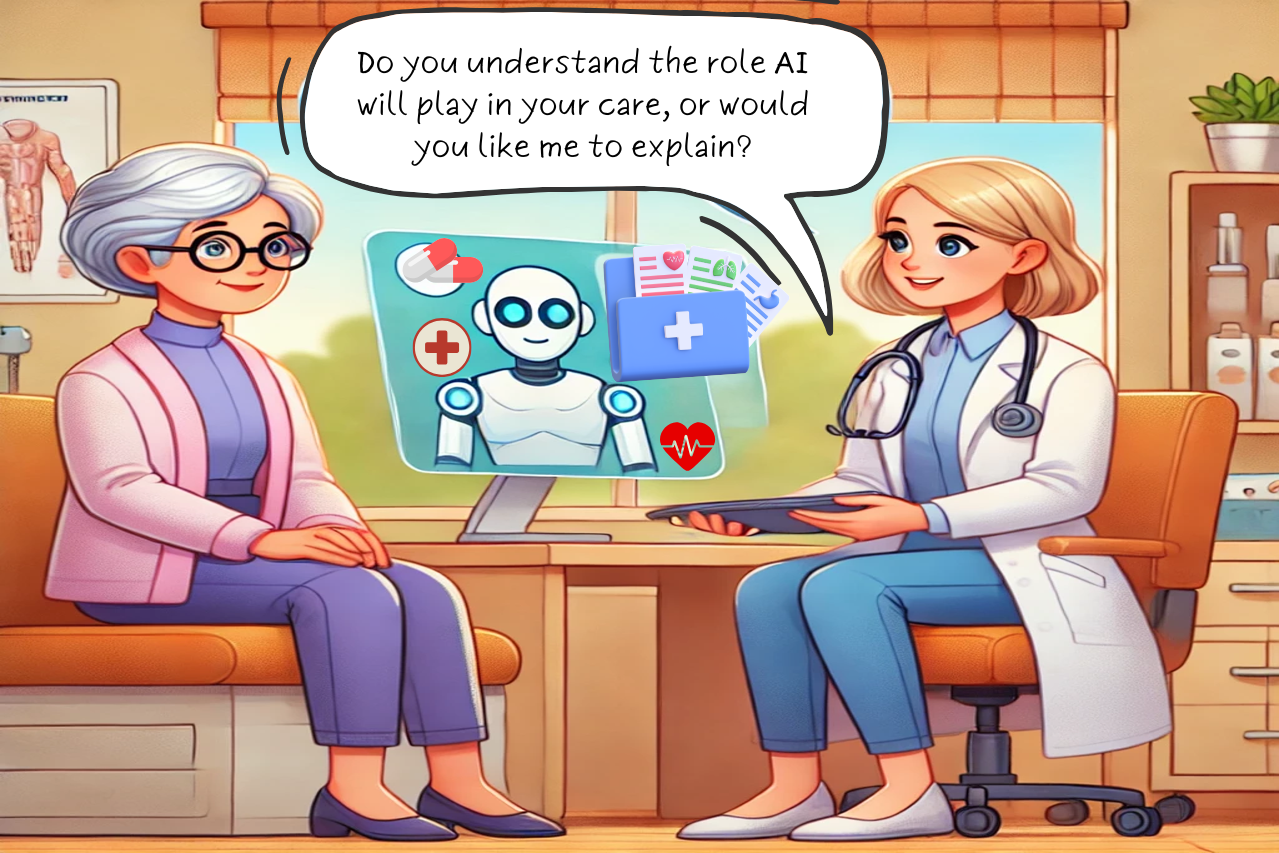1. How Is AI Being Used in My Diagnosis or Treatment?
It’s essential to understand whether AI is actively contributing to your care. Some healthcare providers may use AI tools for diagnosis, treatment recommendations, or even in interpreting medical tests like MRIs or CT scans. Ensure you know whether AI is influencing the decisions about your care, especially in areas like imaging, diagnostics, or treatment plans.
Questions to Ask:
- How is AI specifically being used in diagnosing my condition or determining my treatment plan?
- What type of AI system is being used, and what does it do to assist you in my care?
- Is the AI analyzing my test results, symptoms, or medical history? How does it help with the interpretation?
- Does the AI make recommendations that you review, or is it fully automated in its suggestions?
Understanding how AI fits into your healthcare empowers you to ask the right questions and feel confident that you’re receiving the most informed and comprehensive care possible. It also helps clarify the role of technology versus human oversight in your treatment decisions.
2. How Accurate Is AI in Diagnosing and Treating Patients With My Condition?
Accuracy is one of the biggest promises of AI in healthcare, but it’s also important to acknowledge that AI systems can still make mistakes. Knowing how accurate the AI being used in your care is will help you manage expectations.
Questions to Ask:
- How accurate is the AI tool you are using compared to human judgment?
- What is the error rate of the AI system used for my diagnosis or treatment?
- Can AI misinterpret my health data? How do you cross-check AI’s recommendations?
- Ask about the accuracy of the AI tools being used. Has the technology been thoroughly tested and validated for the condition being treated?
By asking these questions, you can gain a clearer understanding of how dependable the AI is in managing your condition and what safeguards are in place to ensure that its recommendations are sound. This helps build trust in the technology while remaining informed about its capabilities.
3. Is the AI system approved by relevant medical authorities (e.g., FDA)?
AI systems used in healthcare must meet strict regulatory standards to ensure patient safety and efficacy. Many AI tools used in medical diagnosis, treatment recommendations, or surgical assistance require approval by authorities such as the FDA or CE (Conformité Européenne) marking in Europe. Ensuring that the AI tool involved in your care has passed these regulations is vital for trust and reliability.
Questions to Ask:
- Is the AI system used in my care approved by medical authorities like the FDA?
- Has this AI system gone through rigorous testing or clinical trials?
- How frequently are the AI tools in this healthcare setting reviewed and updated based on new regulations or medical advancements?
By confirming the regulatory approval, you ensure that the AI systems in your healthcare are not only cutting-edge but also safe and reliable. This question also helps distinguish between experimental tools and those with a proven track record, which ensures the AI meets safety and efficacy standards.
4. How Do You Ensure That AI Is Making the Right Recommendations?
Even though AI can analyze vast amounts of data quickly, it’s essential that your healthcare provider cross-checks AI’s findings with their expertise. Asking about the checks and balances in place can give you peace of mind.
Questions to Ask:
- Ask how doctors or specialists are involved in overseeing and validating the recommendations or diagnoses provided by the AI system.
- Who is overseeing the AI’s recommendations?
- How do you validate or double-check AI’s recommendations before applying them to my care?
- Are there situations where you override AI’s suggestions based on your judgment?
- How do you handle discrepancies between AI results and your clinical experience?
5. What Are the Benefits of Using AI in My Care?
AI can provide numerous benefits, from improving diagnostic accuracy to reducing wait times. Understanding how AI enhances your healthcare can help you feel more confident in the technology.
Questions to Ask:
- What specific benefits does AI offer in my treatment compared to traditional methods?
- How can AI improve the accuracy of my diagnosis or prognosis?
- Will AI speed up my test results or offer a more personalized treatment plan?
Understanding the benefits helps you see how AI can enhance your care, making it more efficient, accurate, and tailored to your specific health needs. It also emphasizes the value AI brings beyond traditional healthcare approaches, helping you feel more confident in its use.

6. How does AI impact the diagnosis compared to traditional methods?
AI can process vast amounts of data quickly, potentially leading to faster and more accurate diagnoses. In many cases, AI systems can detect patterns and anomalies in medical images or test results that human eyes might miss. However, it’s important to understand whether AI is supplementing traditional methods or replacing them, and how this impacts the reliability of your diagnosis.
Questions to Ask:
- How does AI improve the accuracy or speed of my diagnosis compared to traditional methods?
- Are there specific conditions where AI offers a clear advantage over traditional diagnostic techniques?
- What are the potential drawbacks or limitations of relying on AI for diagnosis versus traditional methods?
- Does AI work alongside human oversight, or is it fully autonomous in diagnosing my condition?
- Does it offer something additional, such as higher accuracy or earlier detection?
Understanding this helps you appreciate the role of AI as an advanced tool that complements human expertise while providing a more comprehensive diagnosis. It also helps clarify how AI can make healthcare more efficient while potentially improving patient outcomes.
7. How Is My Personal Health Data Protected When AI Is Involved?
AI systems rely on large datasets, including patient information, to improve their algorithms and performance. Ensuring your data privacy and security is a top priority when AI is involved in your healthcare.
Questions to Ask:
- How is my health data being used to train or improve AI systems?
- What steps are taken to protect my data privacy when AI is used in my care?
- Who has access to the data used by AI tools, and is it shared with third parties?
- Is my data anonymized before it is processed by AI systems?
- How long is my health data stored?
By asking these questions, you can ensure that your healthcare provider is using robust security protocols to protect your sensitive information. It also helps you understand the safeguards in place to maintain your privacy, even as AI systems analyze your health data for more accurate diagnoses or treatment plans.
8. Can I get a second opinion on the AI’s recommendations?
Even if AI suggests a treatment or diagnosis, it’s important to know whether human experts will review and validate those recommendations. Even though AI tools can offer fast and accurate insights, it’s natural to seek a second opinion, especially if the diagnosis or treatment plan has significant implications. Ensuring that a human healthcare professional reviews or validates the AI’s recommendations is important for patient confidence.
Questions to Ask:
- Can another healthcare professional review the AI’s recommendations before I proceed with treatment?
- How does the second opinion process work if I want a human review of the AI diagnosis?
- Do you rely solely on the AI’s findings, or do you also verify them with other diagnostic methods?
- Is there a process for challenging the AI’s recommendation if it seems inconsistent with my symptoms or previous diagnoses?
By asking these questions, you can ensure that the AI is being used as a tool to assist rather than fully replace human judgment in your healthcare. It also gives you peace of mind that traditional expertise is still available when needed.
9. Is There Evidence That AI Improves Outcomes in Cases Like Mine?
AI is evolving rapidly, but not all applications are universally proven. Asking for evidence that supports the effectiveness of AI in treating your specific condition is a critical step in understanding its value.
Questions to Ask:
- Are there studies showing that AI improves outcomes for patients with my condition?
- Can you provide examples or research showing how AI has been effective in similar cases?
- How has AI been tested for the condition I’m being treated for?
By asking these questions, you ensure that the AI tool is backed by scientific evidence and has demonstrated effectiveness in treating or diagnosing conditions similar to yours. This also gives you more confidence in the use of AI in your healthcare, knowing that it’s grounded in proven results.
10. How Is My Personal Health Data Protected When AI Is Involved?
AI systems rely on large datasets, including patient information, to improve their algorithms and performance. Ensure your sensitive health data is secure and AI systems comply with privacy laws, such as HIPAA (Health Insurance Portability and Accountability Act). Ensuring your data privacy and security is a top priority when AI is involved in your healthcare.
Questions to Ask:
- How is my health data being used to train or improve AI systems?
- What steps are taken to protect my data privacy when AI is used in my care?
- Who has access to the data used by AI tools, and is it shared with third parties?
11. Has AI been tested on diverse populations for this condition?
AI systems can sometimes reflect the biases present in the data they are trained on. If an AI system has not been tested on diverse populations—across different races, ethnicities, ages, genders, and socioeconomic backgrounds—it may not provide equally accurate diagnoses or recommendations for everyone. Ensuring that AI has been tested on diverse groups can reduce the risk of biased outcomes and improve the overall effectiveness of AI in healthcare.
Questions to Ask:
- Has the AI system been trained and tested on diverse populations, including people of different age groups, races, ethnicities, and genders?
- What steps have been taken to ensure that the AI tool used for my condition is unbiased?
- How do you ensure that the AI recommendations are fair and accurate for patients from different backgrounds?
- Are there any known limitations or biases in the AI system that could impact the accuracy of my diagnosis or treatment?
Asking these questions can help ensure that the AI system is equitable and that its recommendations are reliable for people from all walks of life. It also encourages healthcare providers to be transparent about the AI tools they use and their efforts to eliminate bias.
12. Will AI Replace Human Healthcare Providers in My Care?
AI is a tool meant to augment human capabilities, but it’s important to know whether it will be replacing certain aspects of your care. Understanding AI’s role in healthcare can help alleviate concerns about automation replacing human touch.
Questions to Ask:
- Will AI replace any part of your role in my care?
- How will the collaboration between AI and healthcare providers improve my treatment?
- Will I still have access to human providers?
- Are there any parts of my treatment or diagnosis where only AI will be involved?
By asking these questions, you can ensure that AI is used as a supportive tool rather than a replacement for human expertise. This allows you to feel reassured that your care remains in the hands of qualified healthcare providers, with AI serving as a tool to assist them in delivering better, more accurate care.
13. What happens if the AI makes an error?
AI tools, like any technology, are not infallible. Understanding the protocol for handling errors, especially when it involves your health, is critical for ensuring patient safety. It’s important to know whether there are safeguards in place, how errors are detected, and who is ultimately responsible for decisions based on AI recommendations.
Questions to Ask:
- What is the process if the AI system makes a mistake in diagnosing or recommending treatment?
- Is there a protocol for catching mistakes, and how will you be notified?
- How do you verify the AI’s findings to ensure accuracy?
- Who is accountable for the treatment decisions if the AI provides incorrect information?
- Are there backup protocols or human checks in place to catch AI errors?
- Has the AI system made any notable errors in the past, and how were they addressed?
By asking these questions, you can better understand how errors are managed and ensure there are processes to protect you in the event of an AI-related mistake. This transparency can help build trust and ensure that AI is used responsibly in your care.

14. How much control do I have over decisions made by AI?
AI systems are designed to provide recommendations, but patients must have the final say in their healthcare. Understanding the level of control you retain when AI is involved ensures that you remain at the center of your care and that AI is used as a supportive tool, not a decision-maker.
Questions to Ask:
- Can I choose to opt out of AI-driven recommendations if I feel uncomfortable with them?
- How do you involve patients in decisions where AI plays a major role?
- Will you explain AI-generated recommendations to me so I can make an informed choice?
- If I disagree with the AI’s suggestion, are there alternative options?
- Is AI just a guide, or does it have the final say in certain aspects of my treatment?
By asking these questions, you can ensure that AI’s role in your care respects your autonomy. It helps you understand how AI fits into shared decision-making, where the healthcare provider, the AI, and the patient work together to achieve the best outcome. This also reassures you that the technology serves as a support tool rather than a replacement for human judgment or your control over your health decisions.
15. Are There Any Ethical Concerns with AI in Healthcare?
AI’s growing role in healthcare brings with it various ethical considerations, such as data privacy, algorithmic bias, and patient autonomy. Ensuring that AI is used in an ethical and fair manner is critical to maintaining trust in the healthcare system. Understanding how your healthcare provider addresses these concerns can help you feel more confident in AI’s use.
Questions to Ask:
- Are there any ethical concerns related to the use of AI in my diagnosis or treatment?
- How do you ensure that AI systems are free from bias when used in healthcare?
- What measures are in place to protect my privacy when AI is analyzing my health data?
- Who is responsible if an AI system makes an ethically questionable recommendation?
- How do you make sure that AI respects patient autonomy and informed consent?
By asking these questions, you can gain a better understanding of how ethical concerns, such as bias, fairness, and privacy, are managed in AI-driven healthcare. It also helps ensure that your healthcare provider is using AI in a way that aligns with ethical standards and protects patient rights.
16. What AI Tools Should I Be Aware of for My Own Health Management?
Many AI-powered tools are available for patients to manage their health, from fitness trackers to AI-based apps that monitor chronic conditions. Asking your provider for recommendations can help you take a proactive role in managing your health.
Questions to Ask:
- Are there any AI tools I can use to monitor my condition or improve my health?
- What AI-powered health apps or devices do you recommend for ongoing care?
- How can AI help me manage my medication, diet, or fitness at home?”
17. Are There Any Risks or Downsides to Using AI in My Treatment?
While AI can enhance healthcare, it also carries certain risks, such as potential biases in AI algorithms or over-reliance on technology. Understanding the possible drawbacks will allow you to weigh the risks and benefits of AI in your care.
Questions to Ask:
- Are there any risks associated with using AI in my treatment or diagnosis?
- What are the limitations of the AI system you are using for my care?
- How do you address any potential bias in the AI tools that could affect my treatment?
18. How Accurate Is AI in Diagnosing and Treating Patients?
Accuracy is one of the biggest promises of AI in healthcare, but it’s also important to acknowledge that AI systems can still make mistakes. Knowing how accurate the AI being used in your care is will help you manage expectations.
Questions to Ask:
- How accurate is the AI tool you are using compared to human judgment?
- What is the error rate of the AI system used for my diagnosis or treatment?
- Can AI misinterpret my health data? How do you cross-check AI’s recommendations?
Asking these questions helps you better understand the level of reliability of the AI system being used and ensures that any limitations are clearly explained. Knowing how accurate AI is in your specific case provides more confidence in its application to your healthcare.
19. Is There Evidence That AI Improves Outcomes in Cases Like Mine?
AI is evolving rapidly, but not all applications are universally proven. Asking for evidence that supports the effectiveness of AI in treating your specific condition is a critical step in understanding its value.
Questions to Ask:
- Are there studies showing that AI improves outcomes for patients with my condition?
- Can you provide examples or research showing how AI has been effective in similar cases?
- How has AI been tested for the condition I’m being treated for?
20. What Happens to My Health Data Used by AI for Learning Purposes?
AI systems often rely on vast amounts of data to improve their accuracy and performance. When your health data is used for these purposes, it’s important to know how it is handled, protected, and whether it can be traced back to you. You should also be aware of whether your data is being used in research or for commercial development.
Questions to Ask:
- Will my health data be anonymized before being used by AI systems for learning or research?
- Who has access to my data, and how is it protected from unauthorized use?
- How long is my data stored, and can it be deleted upon request?
- Is my data shared with third parties, and if so, for what purposes?
- Can I opt out of having my data used for AI training or learning purposes?
- Is my health data being used to develop commercial AI systems or only for improving care?
By asking these questions, you ensure that your health data is handled ethically, securely, and in compliance with privacy regulations. It also provides transparency about how your data contributes to the improvement of AI systems and whether you have control over its use.




